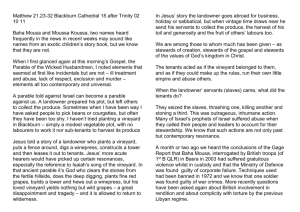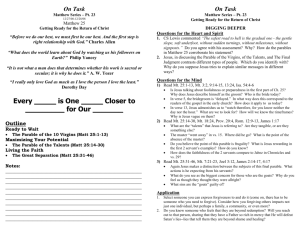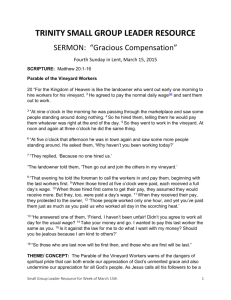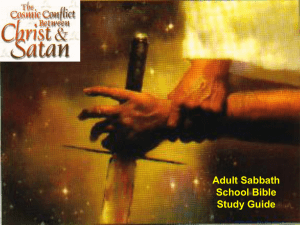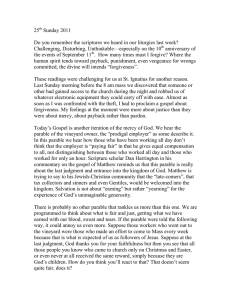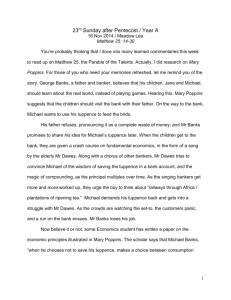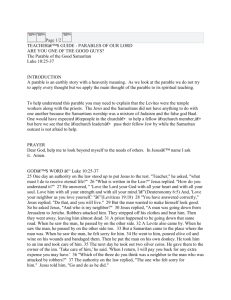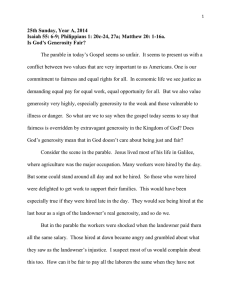Maybe no other words attributed to Jesus has caused as much
advertisement
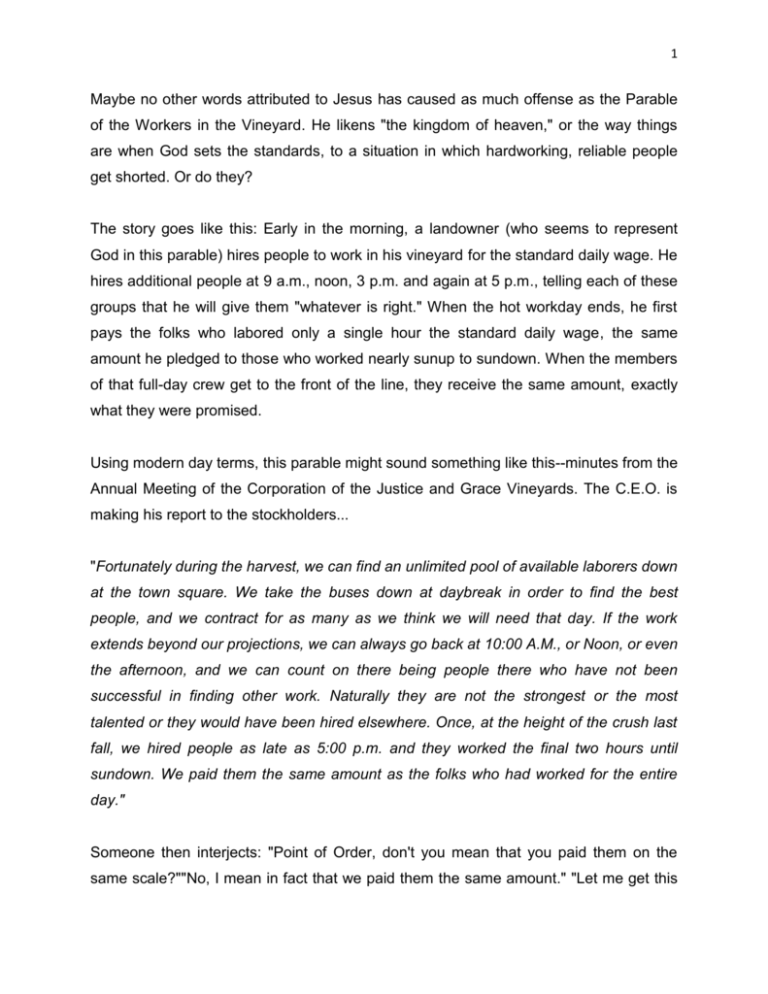
1 Maybe no other words attributed to Jesus has caused as much offense as the Parable of the Workers in the Vineyard. He likens "the kingdom of heaven," or the way things are when God sets the standards, to a situation in which hardworking, reliable people get shorted. Or do they? The story goes like this: Early in the morning, a landowner (who seems to represent God in this parable) hires people to work in his vineyard for the standard daily wage. He hires additional people at 9 a.m., noon, 3 p.m. and again at 5 p.m., telling each of these groups that he will give them "whatever is right." When the hot workday ends, he first pays the folks who labored only a single hour the standard daily wage, the same amount he pledged to those who worked nearly sunup to sundown. When the members of that full-day crew get to the front of the line, they receive the same amount, exactly what they were promised. Using modern day terms, this parable might sound something like this--minutes from the Annual Meeting of the Corporation of the Justice and Grace Vineyards. The C.E.O. is making his report to the stockholders... "Fortunately during the harvest, we can find an unlimited pool of available laborers down at the town square. We take the buses down at daybreak in order to find the best people, and we contract for as many as we think we will need that day. If the work extends beyond our projections, we can always go back at 10:00 A.M., or Noon, or even the afternoon, and we can count on there being people there who have not been successful in finding other work. Naturally they are not the strongest or the most talented or they would have been hired elsewhere. Once, at the height of the crush last fall, we hired people as late as 5:00 p.m. and they worked the final two hours until sundown. We paid them the same amount as the folks who had worked for the entire day." Someone then interjects: "Point of Order, don't you mean that you paid them on the same scale?""No, I mean in fact that we paid them the same amount." "Let me get this 2 straight--you paid a day's wage to people who had only worked for two hours?" Yes, correct, it's what the Owner specified. And then someone yells: "But that's preposterous!" "That's no way to run a business." "I move that we censure the owner and hire a financial management team to come in and set things right." "I second the motion." "All, in favor..." Given the tactics of the vineyard owner, the censure of the Annual Meeting, and the reaction of the Labor Union, is not too farfetched. It gives us more than a little jolt to realize that Jesus is telling this story, and it's one of those stories that is supposed to tell us what God is like, and what the realm of God is all about. God is the vineyard owner. Like so many of Jesus' stories it subverts our norms and values and turns our comfortable world upside down. But also, like many of Jesus' stories, if we stay with it, it can change our lives. When we probe into our case against the vineyard owner, we discover that what upsets us, what we have the most difficulty accepting is his extravagant generosity. He appears to be unfair but only in contrast to his bounteous gifts to the undeserving, to those who did not earn such benevolence and received it anyway. But the reality is that all promises are kept, all contracts are fulfilled. If the parable can be taken as a presentation of God's administration then we are being assured that God's ways are first of all, just. Jesus asks, “Am I not allowed to do what I choose with what belongs to me? Or are you envious because I am generous?” The honest, human, answer to the first question, is, of course: Well, yes. We suppose. But, please don’t do anything too rash…And to the second question: Yes. of course, Lord. We Christians, love grace and mercy. As long as it is directed towards us, towards the people we approve of, and as long as it’s not so lavish as to be embarrassing. Having an eight year old and his cousin who play at our hose regularly, Roy and I end sometimes end up doing a lot of refereeing. Now, they are very good boys to be sure— 3 but they do have a keen, fully developed, and uncompromising sense of fairness built into themselves and their relationship with each other. For example, they keep an internal count of how many play dates they have in comparison with each other. When they perceive the slightest tip of the balance out of their favor, alarm bells go off. It’s unfair! The same goes for ice cream treats, trips to the park, and trinkets and toys. There is a finely tuned scale embedded into their consciousness that is ready to cry out the moment there is the hint of one receiving more favor than the other. Sometimes this is incredibly annoying and irritating. And yet, it illustrates a fundamental aspect of our vulnerability as human beings. You see, in the end, it's not about unfair payments, it is about our value in the eyes of God. At the parable's conclusion, the fullday workers don't moan that they have been cheated. They complain instead to the landowner, "You have made them [the one-hour workers] equal to us." Maybe it's not the generosity or the extravagance that makes them angry. Rather, the issue is this: By dealing generously with a group of people that no other manager in town considered worth the trouble of hiring, the landowner has made a clear declaration about their value, their worth. The landowner's undue kindness thus denies the full-day laborers the bonus they think they can claim: a sense of privilege or superiority. You don't have to read much of the Bible before you notice that it is God's preference to show uncommon compassion to those who don't have it so good. The placement of this parable underscores this lesson. In the preceding story Peter claimed, “we have left everything and followed you." Peter is expecting a reward. In like manner, in a parable following this one, Jesus predicts his death to the disciples for the third and final time and then the mother of James and John requests special privilege for her sons. She says “they too have borne the burden of the day” since they’ve been with Jesus from the beginning of his mission. 4 Jesus warns her and the disciples and us: greatness comes through service and the first will be last and the last first. God’s generosity will not succumb to human jealousy. God provides rain for the just and unjust alike. So we go back to the landowner’s question, “Are you envious because I am generous?” This is the translation of a Greek phrase which literally translates as “Is your eye evil because I am good?” Having an “evil eye” is the complete opposite of generosity. Having an evil eye reveals a great truth and temptation in our life: that money only has value when we think there isn’t enough for everyone. As our first reading shows, the manna came, morning and evening, in answer to the Israelites prayers and pangs. At first they were grateful. But then some wanted to have more. They got up earlier and worked faster at gathering it. And they tried to hoard it, but they couldn’t. Everyone got the same share, when it came to eating. The stored up manna rotted, and the emptiest jars were full. Not being able to control the manna made people angry. And so food became a form of money. And we tend to do this with almost everything--we monetize it. Who’s got the bigger car, better house, nicer clothes, etc. And we tell ourselves we’ve earned what we have, and if we have more we can be proud of our hard work. This parable is a warning against projecting our own opinions about justice and how things should be on to God. When God’s favor is extended towards those of whom we disapprove—well, it’s time to grow up, and begin looking at the world the way that God looks at the world. When God pours out his love and favor towards someone else, we need not worry. If we’d just take the time to look, we’d see that God has filled our cup to the brim too. In fact, it’s overflowing. Perhaps it is time for us to adjust out notion of value according to God's vision and mission in our lives.
